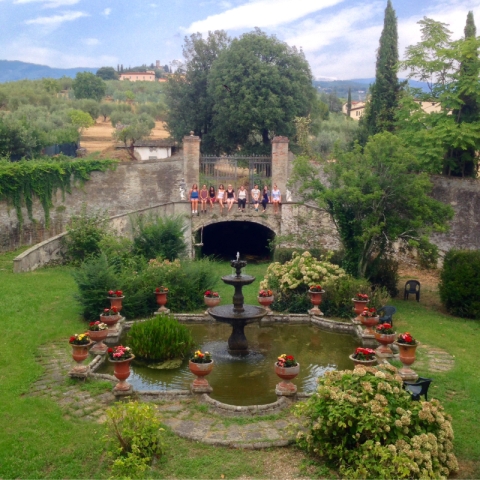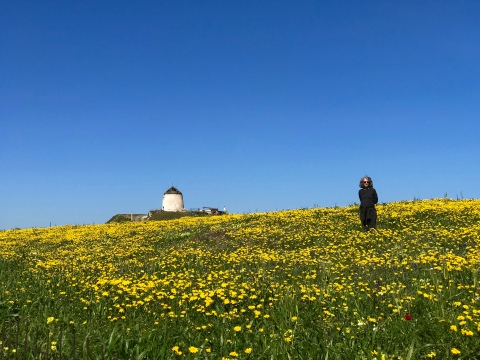Which Ancient Philosopher Are You?
31, December 2019 § 2 Comments
Epicureanism. Living gracefully within the garden of nature.
The Aegean Center students and staff spend a month each fall living and studying in the Villa Rospigloisi, in Pistoia, Italy. Besides classes in drawing and photography, we learn about Renaissance art and travel most days to see masterworks, returning with gratitude each evening to our villa in the hills. We often linger in the garden in the hours before dinner, watching the light play over the 400 year old magnolia trees, listening to the fountain splash and enjoying the aroma of food coming from the kitchen. We have few distractions, plenty of time to converse, and delicious home cooked meals. The combination of study and simple living create a joyous and rewarding month.
 Our Villa Garden in Tuscany
Our Villa Garden in Tuscany
The fact that we are studying in Italy and Greece compels me to introduce a short conversation about ancient philosophers to my students. To make this interesting we read short synopses of seven different philosophies of the ancient world and see which of these resonates with their ideas of how to live a good life. Through a series of questions most of my students this term decided that they identified with Epicureanism. One student decided he was a nihilist, though that wasn’t on the list, and a few were drawn to Neoplatonism.
Epicurus was a 3rd BCE philosopher who believed that through elimination of fears and desires (ataraxia) people would be free to pursue simple pleasures to which they are naturally drawn. His followers were known as the Garden People and worked to banish superstition and cultivate a rational understanding of nature. Unlike many other philosophical discourses, women were allowed and urged to join his circle. Epicureans felt that discovering simple pleasures and living a prudent life leads to the greatest social happiness, that understanding the power of living within nature’s limits was essential. The word Epicureanism is misunderstood now as advocating hedonism but the philosopher himself said that a person can only be happy and free by living wisely, soberly, and morally. He said, “Nothing is enough for the man for whom enough is too little”. Our intention is to create an arts program with echos of this joyful search for individual happiness. We stress living with few material requirements, eating food prepared with pure ingredients and being in nature. We have no pretensions to luxury and yet we provide a wonderfully rich and fruitful atmosphere in which students can achieve their best . When simple wants are satisfied we have a deeper appreciation for the aesthetics aspects of life, of beauty, of art.
 Epicurus
Epicurus
In contrast to my students, I tend toward the Stoic philosophy. Again, modern understanding of this philosophy misinterprets Stoicism as merely censoring strong emotions. Marcus Aurelius and Epitectus elucidate the philosophy of Stoicism as a guide to find peace; integrity being the chief good. Epitectus said, ““Happiness and freedom begin with a clear understanding of one principle: Some things are within our control, and some things are not. It is only after you have faced up to this fundamental rule and learned to distinguish between what you can and can’t control that inner tranquility and outer effectiveness become possible.” What he believed was true education consists in recognizing that each individual has their own will and cannot be compelled or hindered by anything external. He felt that individuals are not responsible for the thoughts that arrive in their consciousnesses though they are completely responsible for the way in which they use them. “Two maxims,” Epictetus wrote, “we must ever bear in mind—that apart from the will there is nothing good or bad, and that we must not try to anticipate or to direct events, but merely to accept them with intelligence.”
 Filigree of Wildflowers on Paros
Filigree of Wildflowers on Paros
And, “Wisdom means understanding without any doubt that circumstances do not rise to meet our expectations. Events happen as they may. People behave as they will.” Finding that my ideals on how to live aligned best with the Stoics I also realised it aids my teaching; empowering me to honour each individual‘s place in the hierarchy of learning, reconfirming that competition has never been an effective teaching tool. I also recognise that what I say and what I teach will be taken by each student to mean what they interpret it to be and not always what I have said. Patience and being an attentive listener are paramount in a teacher but Stoicism also illustrates that 14 different students will have 14 different approaches to a given lesson. Each student will need specific help to elicit their best qualities. It’s not about meeting my standards as much as it is about their comprehension. And, of course, a teacher must accept that each group has its own personality. Fortunately in this group, they were mostly Epicureans by nature.
 Yellow & Blue Paros Spring
Yellow & Blue Paros Spring
